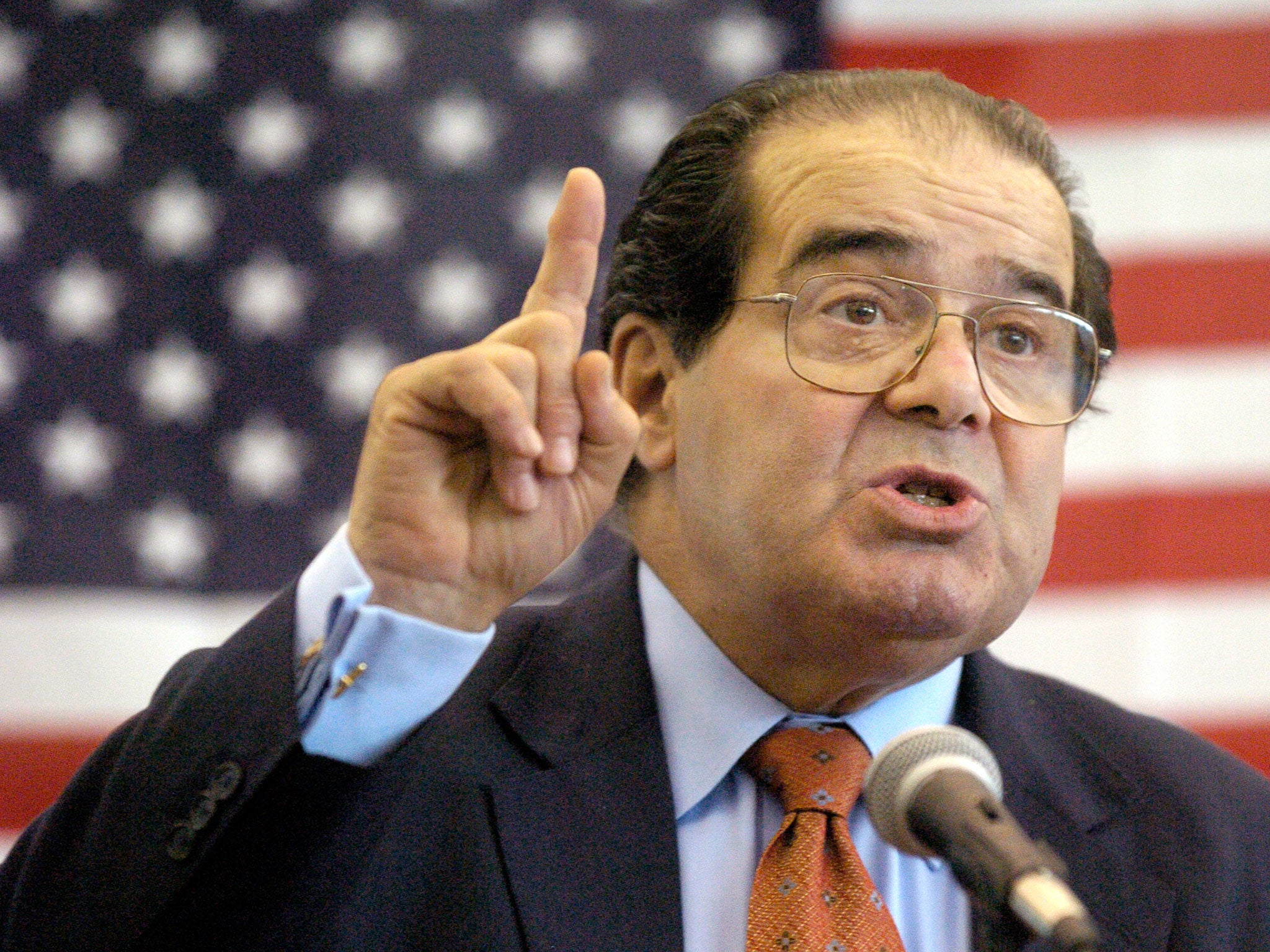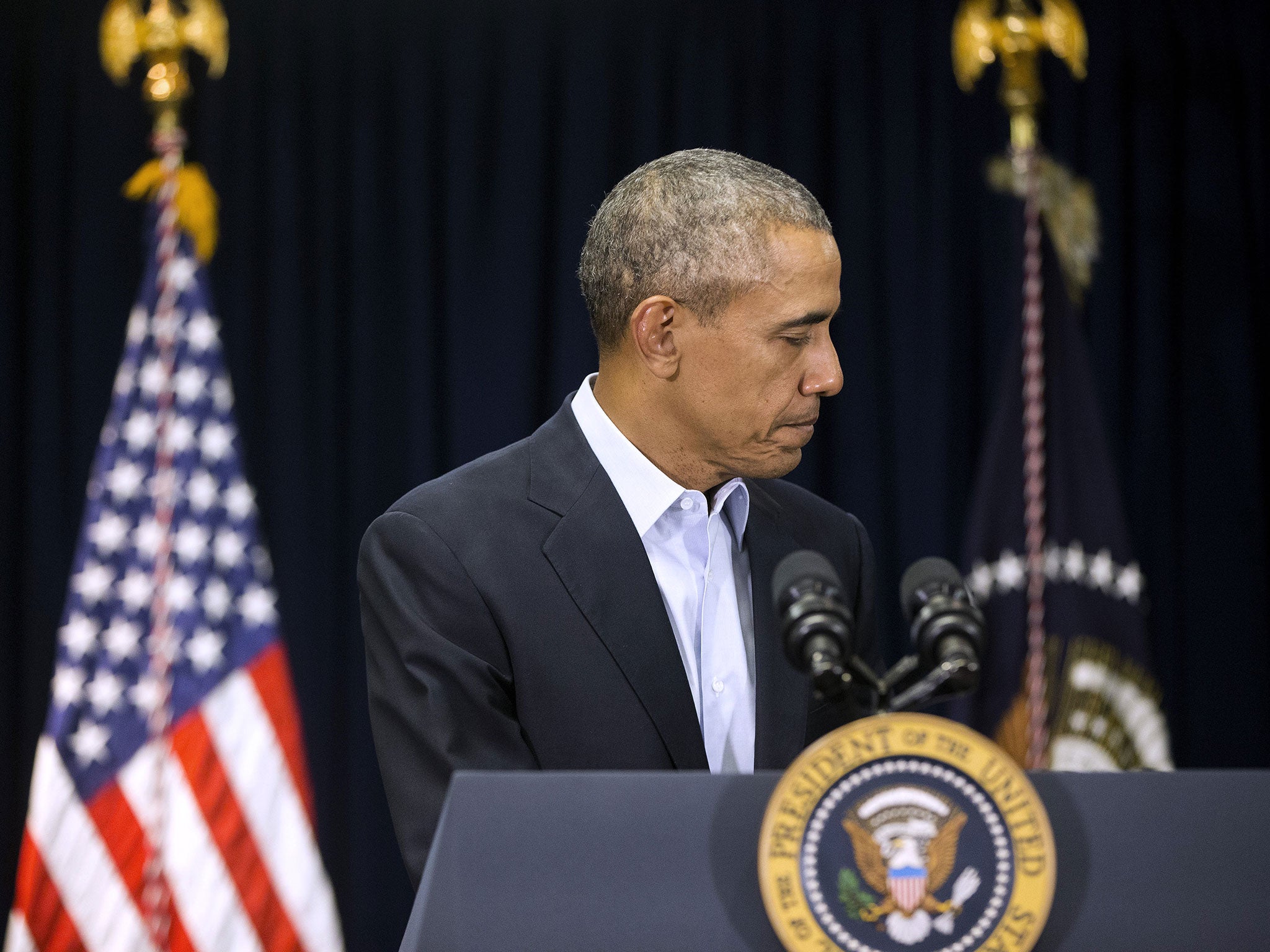Antonin Scalia: Death of conservative Supreme Court justice creates new political battlefield in Washington
Though he was derided – and feared – by most American liberals, few doubted his extraordinary influence

Your support helps us to tell the story
From reproductive rights to climate change to Big Tech, The Independent is on the ground when the story is developing. Whether it's investigating the financials of Elon Musk's pro-Trump PAC or producing our latest documentary, 'The A Word', which shines a light on the American women fighting for reproductive rights, we know how important it is to parse out the facts from the messaging.
At such a critical moment in US history, we need reporters on the ground. Your donation allows us to keep sending journalists to speak to both sides of the story.
The Independent is trusted by Americans across the entire political spectrum. And unlike many other quality news outlets, we choose not to lock Americans out of our reporting and analysis with paywalls. We believe quality journalism should be available to everyone, paid for by those who can afford it.
Your support makes all the difference.The sudden death during a quail-hunting trip of the strongest conservative voice on the United Supreme Court, Antonin Scalia, has created a whole new political battlefield in Washington as President Barack Obama vowed to nominate a successor and Republicans pledged to block him.
Appointed to the Court by President Ronald Reagan 30 years ago, Mr Scalia was found dead in his room at a resort on Saturday morning after he failed to show up for breakfast. There was no sign of foul play, officials said. Aged 79, he had been the longest serving among the nine justices who make up the Supreme Court, the third arm of American government alongside Congress and the presidency.
His death leaves the court split evenly, with four justices on either side of the liberal-conservative divide.
That temporary balance could have profound consequences in the months ahead as key planks of Mr Obama’s legacy come up for scrutiny in the Court, including his limits on fossil-fuel emissions, affirmative action, voting rights and his order protecting millions of illegal immigrants from deportation. But it is the longer term that matters more. Rarely will picking a new justice have been more fraught with political and ideological angst. Whoever is chosen will exercise a swing vote in the future court, deciding whether it becomes a new force for progressivism or conservatism in America.
First though, will come the grieving for a legal mind that has had few equals in the modern age. Flags across Washington were at half mast yesterday for Mr Scalia, not least outside the imposing building that is America’s highest court, which for more than 200 years has made some of the most momentous decisions on the laws that govern the whole of the United States.
Though he was derided – or more accurately feared – by most American liberals, few doubted the scholarship of Mr Scalia or his extraordinary influence as a conservative on the court, and thereafter the nation as a whole. This only resonated more loudly as the decades since Mr Reagan nominated him passed.
In recent years he had been on the losing side of key decisions that will come to define the Obama presidency. On healthcare, he opposed the ruling that confirmed the legal basis of the Affordable Care Act, or Obamacare, and he was against upholding the sudden swing among the lower courts towards protecting the rights of gays to marry. If there was languor in the court when he first joined, he soon changed that, writing pointed, often spicy opinions either in dissent of rulings or with the majority, and deploying sharp lines of questioning in oral arguments.
His conservatism, on issues ranging from abortion to affirmative action for minorities, was a product partly of his commitment to so-called “originalism”, where he would attempt to see what the perspective of the framers and authors of the American Constitution would have been as he considered each case.

“He was an extraordinary individual and jurist, admired and treasured by his colleagues,” Chief Justice John G Roberts Jnr said in a statement confirming Mr Scalia’s death on Saturday. “His passing is a great loss to the Court and the country he so loyally served.”
The political fallout from his untimely death spread quickly yesterday. While Democrats instantly saw an opportunity for Mr Obama to put a third justice on the court before he leaves office next January – and thus ensure it has a complexion more to his liberal liking for years to come – Republicans rose up as one to describe Mr Obama as a lame-duck President who should desist from doing any such thing.
“The American people should have a voice in the selection of their next Supreme Court justice,” said Senator Mitch McConnell of Kentucky, the Republican Majority Leader. “Therefore, this vacancy should not be filled until we have a new president.”
While Mr Obama flagged his own his intention “to nominate a successor in due time”, he faces a difficult choice. With only 46 Democrats in the 100-strong Senate, does he nominate someone sufficiently conservative to stand at least a chance of being confirmed – or instead a person who is explicitly liberal, and thus set up a fight on Capitol Hill that could drag on for months?
“He could nominate a more liberal candidate who would have no real chance of getting through a Republican Senate – in which case this would become a salient political issue in 2016,” Rick Hasen, a law professor at the University of California, Irvine, noted. If Mr Obama were to take the bold route, he can be assured of galvanising the Democratic Party precisely as the race to succeed him gets into high gear.
That could be a boon for whoever becomes the Democratic nominee, Hillary Clinton or Bernie Sanders, even if the squabbling on Capitol Hill ends with Mr Obama’s choice for the Court going down in flames.
Mr Scalia’s death and the question of what happens next has thrown a grenade into the Republican presidential nomination race, with Senator Ted Cruz of Texas using a debate on Saturday night to aver that having the unpredictable Mr Trump choose a new Justice – if Mr Obama is unable to – would be a catastrophe.
“He will appoint liberals,” said Mr Cruz, who is trailing Mr Trump in polls in South Carolina which holds its primary next Saturday. “Two branches of government hang in the balance, not just the presidency, but the Supreme Court also. If we get this wrong, if we nominate the wrong candidate, the Second Amendment, life, marriage, religious liberty, every one of those hangs in the balance.”
At the debate, Mr Trump aligned himself with his rivals in the need to block any attempt by Mr Obama to choose a new justice. “It’s up to Mitch McConnell and everyone else to stop it,” said Mr Trump, the biliionaire developer and current Republican front-runner. “It’s called delay, delay, delay.”
Join our commenting forum
Join thought-provoking conversations, follow other Independent readers and see their replies
Comments